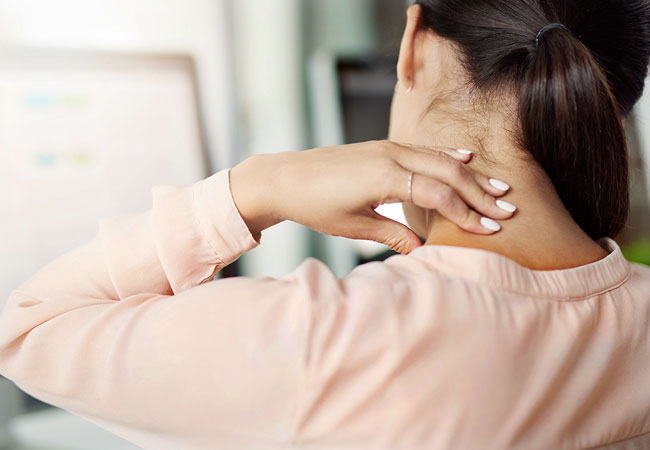Poor posture while sitting, standing, or sleeping can cause pain of stiff neck. Fortunately, there are ways to get rid of the rigidity of the occipital muscles, reduce pain and tension in the neck. These remedies are easy to follow, and they are very effective in treating pain and reducing soreness. Read this article to find out how to cope with the rigidity of the occipital muscles, tips for preventing it and other treatment options.
What is a stiff neck?
Neck rigidity is a condition where it is difficult for you to move your neck and you feel that your neck is stuck at a strange angle. This usually happens when you wake up from sleep or after a busy day. The rigidity of the occipital muscles can be painful, uncomfortable, interfere with normal activities and prevent you from sleeping well.
Stiff Neck rigidity can be caused by various reasons. Some of the most common causes of occipital stiffness are actions such as watching a monitor or smartphone or driving a car for a long time.
Some of the other reasons are:
- muscle stretching
- sleeping in an awkward position
- poor posture, like a stoop
- injuries sustained during sports or during training
Treatment to get rid of stiff neck rigidity
In most cases, medical care for the rigidity of the occipital muscles is not required. It can be treated at home by following these steps:
Get some rest
Research shows that rest is important for muscle recovery because it helps in the healing process. The best thing you can do when you have stiff neck muscles is to rest and avoid strenuous activity.
Sometimes neck pain is caused by “wear and tear” that occurs in the bones and joints of the neck. This is a type of arthritis called cervical spondylosis.(external link opens in a new window/tab) Cervical spondylosis occurs naturally with age. It doesn’t always cause symptoms, but in some people, bone changes can cause stiff necks. As bones and joints wear down, nerves that detach from the spinal cord to the neck may be flattened. This can cause neuralgia in the arms, shoulders, or occasionally up to the head. You may also experience pins and needles or numbness
Use heat and cold therapy
Studies show that hot and cold therapy helps reduce inflammation and reduce muscle soreness. You can attach an ice pack or put a bag of hot water on your neck to relieve the pain caused by stiff neck.
- Ice can assist with diminishing irritation and enlarging by bringing blood stream down to an area. Heat does the opposite and stimulates blood flow.
- Ice and heat work together to help soothe a strained or torn muscle and give it time to heal. They provide timely relief from pain in overworked areas of the body, such as the neck.
- The American College of Orthopedic Surgeons (AAOS) recommends applying ice for 20 minutes several times a day to treat soft tissue injuries. Make sure you buy or make a cold compress to prevent the ice from coming into direct contact with your skin.
- You can alternate between ice and heat. It is also possible to take a hot bath or shower or use a heating pad
Take over-the-counter medications
Nonsteroidal anti-inflammatory drugs, such as ibuprofen and naproxen, are usually taken to relieve pain caused by stiff neck of the occipital muscles. There is some evidence to support their effectiveness, but further research is needed to establish how effective and safe they are. Before self-medicating, consult with your doctor whether any of the aforementioned medications can be taken.
Tips for preventing stiff neck
It is quite easy to get rid of the rigidity of the occipital muscles in most cases. This includes some simple lifestyle and posture changes. In addition, regular workouts can help strengthen the neck muscles and make them less prone to stiff neck. Research suggests that incorporating strength training into your workout may help reduce stiff neck pain.
Use ergonomic furniture
Most of you work for long hours in front of a computer or laptop screen for a week. You tend to slouch while working or use unsuitable furniture during work, which can disrupt your posture. This can be fixed with ergonomic chairs.
There are some tips that can help you maintain proper posture while working, as well as prevent the rigidity of the occipital muscles:
- Adjust the chair so that your feet are on the floor and your knees are below hip level.
- Sit with your back straight and keep your hands level with the table.
- If possible, use a keyboard and mouse with ergonomic characteristics.
- the height of your laptop should be at the level of your eyeline.
- Take a little walk and stretch a little every hour or so.
Reduce the time spent on your smartphone
Constant looking at the phone can cause tension and fatigue of the neck muscles. Studies show that excessive smartphone use can increase the likelihood of neck pain.
It can be difficult to completely abandon a smartphone. These simple tips will help reduce the strain on the neck when using a smartphone.
- Look at the phone at eye level.
- Try not to hold your smartphone between your ear and shoulder to answer calls for long hours. Use wired or wireless headphones to receive calls.
Take breaks if you travel for long hours
long trips and trips are fun, but at the same time they load your neck. If you spend too much time behind the wheel and after that you have stiffness of the occipital muscles,
these tips can help prevent this:
- Take frequent breaks to get up and stretch.
- Consciously watch your posture while driving.
- Adjust the seat so that it occupies a comfortable position and make sure that it has a good view of the road.
- Swap places with a friend or partner if possible.
Do neck stretching exercises
Another simple way to prevent the rigidity of the occipital muscles is to regularly perform a few simple stretching exercises.
Try these basic stretching exercises that can help prevent stiff neck:
- Place your fingertips under your chin and gently lift your neck to stretch it up. To stretch downwards, interlock your fingers, place them on the back of your head and gently press down.
- Slowly turn your head from left to right.
Change your posture and sleep habits
The position in which you sleep can affect your neck and cause stiff neck if you sleep awkwardly.
Follow these simple tips to avoid stiff neck:
- Sleep either on your back or on your side, not on your stomach. Sleeping on your stomach puts too much pressure on your neck.
- Use down pillows or memory foam pillows, as they adapt to the shape of your neck.
- Do not use pillows that are too high or too hard.
Get a stiff neck massage
Ask someone to massage your neck to ease the pain. Make sure the pressure is soft and not too strong. If the massage seems unpleasant or painful, ask to stop it immediately.
Types of neck massagers
There’s an extensive variety of neck massagers — from little manual rollers to knead seats with intensity and vibration. Some mimic back rub strategies like shiatsu or Swedish back rub.
Well known sorts of neck massagers include:
- plying knead pads
- percussive massagers, or back rub weapons
knead balls - knead pads
- pressure point massage balls and mats
- TENS (transcutaneous electrical nerve feeling) gadgets
Neck massagers range in size, capability, and cost. They can give a few advantages in the event that you’re searching for momentary neck, shoulder, and back help with discomfort, and to diminish pressure and increment unwinding toward the finish of a long, hard day.
How we chose
With regards to neck massagers, cost isn’t a sign of value, adequacy, or power.
In the event that you’re new to these gadgets, search for a massager that accompanies a time for testing and full unconditional promise.
While thinking about which item to purchase, pose yourself the accompanying inquiries:
- What kind of back rub am I attempting to mimic?
- Will I be rubbing myself or another person?
- Assuming I’m kneading my own back, neck, and shoulders, could I at any point really control this massager?
- Is it vital to me to have various percussion and power choices?
- Is an intensity knead significant?
- Do I have sufficient strength in my grasp to utilize a manual massager successfully?
- What is my spending plan for this gadget?
- Might I at any point effectively take this with me?
Reduce the range of motion
Avoid rapid neck movements, instead gently turn your neck from side to side to ease the tension a little. You can also gently shake your head up and down.
Use a neck collar
Use a neck collar to keep your neck upright and ease the pain. Try not to use the collar for a long period of time.
When to see a doctor?
If the pain caused by the rigidity of the occipital muscles interferes with your daily activities, it is recommended to consult a doctor. Some other situations where you may need medical attention include:
- You experience stiff neck and pain in the neck after an injury or a car collision.
- The pain caused by the rigidity of the occipital muscles radiates into the arms and legs.
- These signs may indicate some underlying medical problems, so it’s best to check yourself.
When to contact a doctor about neck or shoulder pain
Neck and shoulder torment might have fundamental causes that need clinical help. A large portion of these hidden circumstances answer well to over-the-counter medicines. Others might require endorsed medicines, including active recuperation, drug, or medical procedure.
Likely reasons for neck and shoulder torment that might require a specialist’s consideration include:
- frozen shoulder
- bursitis
- osteoarthritis
- rotator sleeve tears
- circle degeneration
- herniated cervical circle
- Get intense, serious torment that comes on suddenly looked at by a medical services proficient. Constant agony that impedes your everyday, including rest, likewise requires a medical services proficient feedback.
- The sooner you can get a finding, the sooner you can begin treatment and start to feel improved.
Neck Pain in Children
Stiff necks aren’t just something that happens to adults. Children may also experience neck soreness. Home remedies such as ice packs, massages, neck stretches, and over-the-counter pain relievers can also help your child. Make an appointment with your doctor or pediatrician if your child has:
- Has a physical issue or has as of late experienced head or neck injury
- Is excessively worn out
- Was nibbled by a tick
- Has a skin rash, migraine, or influenza like side effects
- Is queasy or regurgitating
- Is fastidious or crotchety
- Is a newborn child and is having issues nursing or sucking a container
Takeaway
Neck pain is a common problem that affects millions of people every year. Most of the time, stiff neck accompanied by mild pain can be treated at home with ice, over-the-counter pain medications, and light stretching.
Lifestyle modifications can also help reduce and prevent neck pain. Try taking a break from your computer or phone and pay more attention to your posture. If you find yourself waking up often with a sore or stiff neck, consider adjusting your sleeping position or trying a new pillow. If your neck pain persists, worsens, or has other symptoms, contact your doctor. This is especially important if you have recently been injured. As soon as the problem is detected, it is immediate



0 Comments